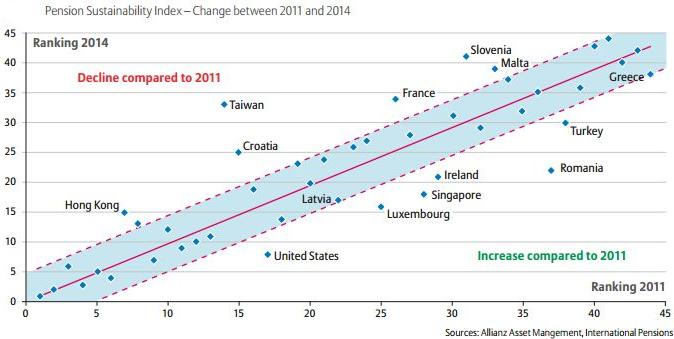Analytics, EU – Baltic States, Legislation, Pensioners, Rating
International Internet Magazine. Baltic States news & analytics
Monday, 05.01.2026, 10:08
Latvia's pension system ranked 9th best in the world
 Print version
Print version
Australia takes the top spot in the latest rankings, with its two-tier system of lean public and highly developed funded pensions putting the country under the least pressure to reform. Australia is followed in order by Sweden, New Zealand, Norway and the Netherlands in the tables.
The Allianz Global Investors report says western European countries benefit from their "comprehensive pension systems based on strong, funded pillars". Sweden and Norway have scored well thanks to their "comparatively solid public finance situation", with Norway's high legal retirement age and moderately ageing population also helping the country to a high ranking.
The report found the pension systems of Thailand, Brazil and Japan to be the least sustainable in the long run. Japan came at the low end of the rankings because of its very old population and very high sovereign debt level, making its pension system too expensive and the need for reform "an ongoing concern".
The Pension Sustainability Index "systematically examines relevant elements of pension systems" to assess their long-term sustainability; fifty countries were analyzed in this year’s index.

The world's ten best pension systems:
1. Australia
2. Sweden
3. New Zealand
4. Norway
5. Netherlands
6. Demark
7. Switzerland
8. United States
9. Latvia
10. United Kingdom
Thailand is under the highest
pressure to reform. The system has an extremely low retirement age as well as
sporadic coverage due to its large informal sector. It has replaced Greece, which
improved after its strong reform efforts, as lowest ranking. Brazil comes in as
second lowest: with the country’s high
replacement rate and low effective retirement, its system does not appear to be
sustainable in the future.
At the other end of the table, Australia – with its two-tiered system of lean public and highly developed funded pensions – seems to be most sustainable in the long run. Australia’s top position is followed, in order of ranking, by Sweden, New Zealand, Norway, the Netherlands and Denmark.
Although rankings within the index should not be considered in absolute terms, as they reflect a given country’s situation assessed in the context of a broad group of peers, the 2014 PSI does reveal significant changes from 2011. Under the adjusted rankings (comparable to 2011 country list), Greece, Ireland, Luxembourg, Romania, Singapore, Turkey and the US were able to move more than five places upwards in the rankings. A combination of different factors led to this shuffle – in particular, improved aging perspectives, the introduction of pension reforms and an improved economic development that helped take pressure from public finances.
Croatia, France, Hong Kong, Malta, Slovenia and Taiwan dropped significantly in the ranking.
One of the reasons was a new population projection that showed a more rapid aging, in some cases, the given country’s delay in implementing major pension reforms.








 «The Baltic Course» Is Sold and Stays in Business!
«The Baltic Course» Is Sold and Stays in Business!

